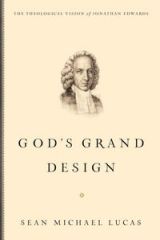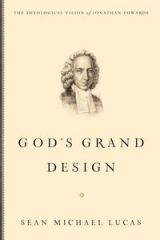 Sean Michael Lucas, God’s Grand Design: The Theological Vision of Jonathan Edwards (Wheaton, IL: Crossway, 2011). $17.99, 224 pages.
Sean Michael Lucas, God’s Grand Design: The Theological Vision of Jonathan Edwards (Wheaton, IL: Crossway, 2011). $17.99, 224 pages.
My doctrine of salvation is Arminian, so you may wonder why I think highly of Sean Michael Lucas’s study of Jonathan Edwards, whose soteriology was Calvinist. The answer is twofold:
First, Lucas has written an accessible introduction to the biblical theology and pastoral practice of “America’s greatest theologian”—as Robert Jenson described Edwards. Whatever their theological stripes may be, interested students of theology are in Lucas’s debt for this service. Edwards’s literary corpus is large and his thought complex, but Lucas ably guides his readers through Edwards’s theology, showing its narrative unity, comprehensive scope, and direct connection to pastoral practice. He illustrates this theology with well-chosen quotations from Edwards works, situating Edwards’s writings in their historical context. And Lucas appends an “Annotated Bibliography” of the best primary sources by and secondary sources about Edwards, so that readers new to Edwards can know what to read first.
Second—and to my mind, most important—by offering this accessible introduction, Lucas offers contemporary pastors an Edwardsian model for how to integrate biblical theology into their own pastoral practice. This offer comes across explicitly in the appendix, “‘A Man Just Like Us’: Jonathan Edwards and Spiritual Formation for Ministerial Candidates.” But it is implicit throughout the rest of the book. Lucas’s intent for this book, in other words, is not merely historical. Rather, the history serves a larger purpose: namely, helping ministers better understand and practice their divine vocation.
Lucas demonstrates the connection in Edwards’s ministry between what today we might call message and method. The message of the gospel is the desire of the Holy Trinity to take up creation into its own glory, a desire accomplished by the redeeming work of Jesus Christ and reflected by how Christians live. That life is characterized not merely by right beliefs or right actions but most important by right “affections” or “virtue.” The methods by which we promulgate this message must be appropriate to the end God seeks. Ministers, therefore, must call people to faith in Jesus Christ, a faith that produces an all-encompassing love for God and neighbor. The “means of grace” Edwards considered appropriate to this end were preaching, the sacraments (baptism and communion), and prayer.
Obviously, as an Arminian, I have concrete objections to aspects of Edwards’s soteriology, for example, his anti-Arminianism. Lucas (quoting Gerald McDermott) notes that “Edwards’s struggle with Arminianism was but a battle in a life-long war with deism.” Edwards, it seems to me, routinely collapsed Arminianism into deism, even though no less than the evangelical Arminian John Wesley published an edited version of his Religious Affections. So, I must demur from many of Edwards’s conclusions. Nonetheless, and following Wesley’s example, it seems to me that religious affections might be a point of rapprochement between evangelical Calvinists and Arminians. Didn’t Wesley also speak of “heart religion,” after all?
Perhaps it is time that we Arminians stopped thinking of Edwards as a Calvinist only and started thinking of him as a teacher of the entire Church, including us. Obviously, we can’t accept everything Edwards teaches. (Even Calvinists don’t do that!) But we can learn much and benefit greatly from his manifold insights. (Who knows, maybe Calvinists will start treating Wesley in the same way…)
I doubt Lucas intended his book to produce such thoughts in Arminians, but it produced such thoughts in this Arminian. So, I affectionately recommend God’s Grand Design.
P.S. If you found this review helpful, please vote “Yes” on my Amazon.com review page.

